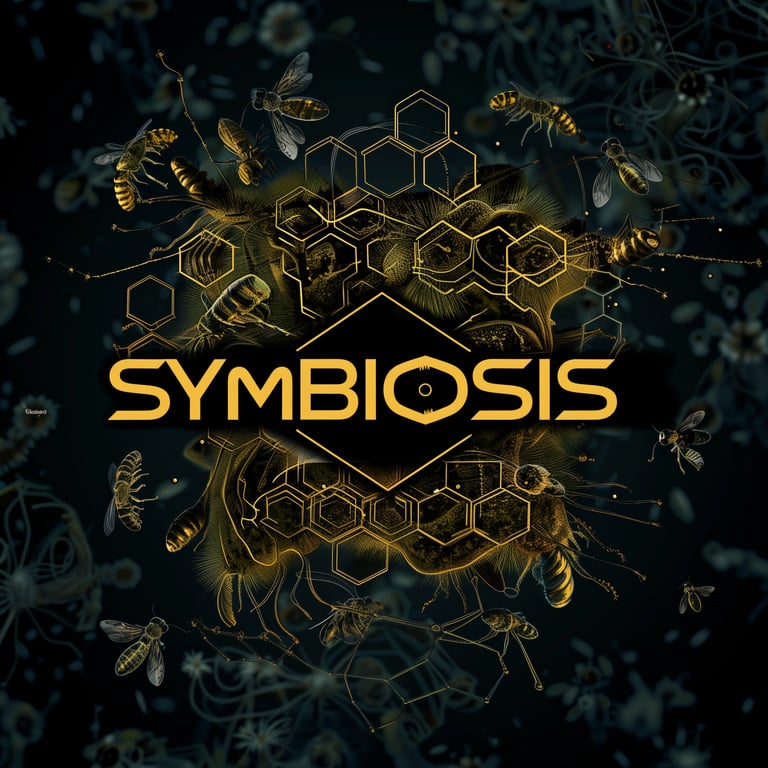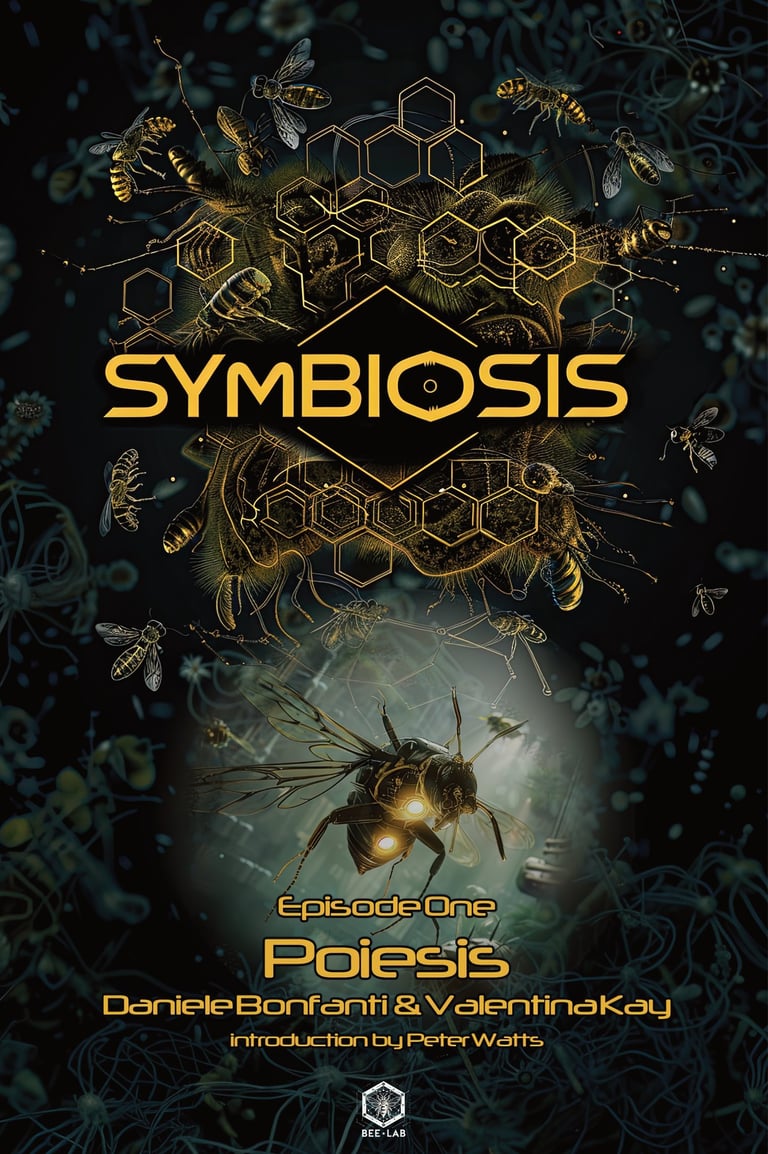Symbiosis
A bee colony commands a star sailship capable of converting into thought to navigate through the mind of the Universe.
A serial novel in bite-sized episodes of wild adventure and mind-twisting space horror.


"Absurdly original" -- Peter Watts
From Amazon.com bestselling duo comes a serial novel blending wild cosmic adventure and mind-twisting space horror, published in bite-sized episodes perfect for a single reading session!
Modifying bees, genetically and cybernetically, did not save Earth from Eco-Singularity. But the surviving few who made it to Ganymede rebooted civilization as the Symbiosis: a covenant of humans and bee-colony superorganisms.
Captain Petra, a bee colony, helms the starship Endurance—a traveling ecosystem reminiscent of a Mediterranean village (plus photosynthetic hull, greenhouse main deck, and dark energy sails). With her daredevil crew of varied lifeforms, they travel via the ridiculously dangerous icebreaking process, which implies converting into thought to navigate through the mind of the Universe.
Have you heard Fractal Harmonics, by the way? It’s the ultimate, inherently incomprehensible, theory of everything. Centuries old by now, it brought all the answers we were looking for, with the lunatic meta-musicians who replaced mathematicians giving us incredibly cool technologies and faster-than-light travel—via the ridiculously dangerous icebreaking process, which implies converting into thought to navigate through Psi, the mind of the Universe.
The fundamental principle that our minds collapse Psi cognitions into perceptions, creating the body of the Universe (reality, if you prefer), is by now common sense. But Fractal Harmonics brought forth a colossal bitter pill as well: the Epistemic Walls. The “end-of-the-line” for any further development of science and technology.
And so, the only means to expand the borders of knowledge went back to being great journeys of exploration.
Ready to follow the epic voyage of the Endurance en route to the Galaxy Pole?
And what the hell has all this to do with the horrific events taking place on three different alien planets 10,000 years later, linked to the reactivation of an ageless, Escherian palace—a prison, a lost temple, a place of worship, but apparently the same building for all three?
Are the deeds of the Endurance sailors causing or preventing a multi-world apocalypse? (or both?)


Episode One: Poiesis Out Now at 0.99$
Get it on Amazon
Free (for now) with Kindle Unlimited
Doctor Who isn’t too far off the mark here, actually. Poiesis is something like what you’d get if Sam Peckinpah and Quentin Tarantino collaborated on an episode of that show with Douglas Adams acting as creative consultant.
(from the introduction by Peter Watts)
POIESIS - In this pilot Episode—a 70-page, standalone novella—they encounter a derelict, monstrous ship. Petra boards it with augmented ex-pirate Nox, erudite grunt Velasquez and the flowering plant-like alien Wyk.
Expect: guts of the ship which look like actual guts, cyber-zombies, a multi-species séance, gunfights with exotic weapons, and gory melee.
Warm up your brain for Fractal Harmonics: the ultimate, inherently incomprehensible theory of everything. Centuries ago, the lunatic meta-musicians of Ganymede demonstrated that reality is created by our minds through poiesis: collapsing cognitions in the Universe’s mind—Psi—into perceptions. This brought all the answers and ultra-cool tech. Too bad Fractal Harmonics brought the Epistemic Walls as well—the end-of-the-line for any further scientific development. One such Wall is Resonance Conservation: the impossibility to build a true, poietic artificial mind.
Someone or something, aboard the ghost ship, won’t accept this inescapable law…
Will the explorers manage to escape the crazed thing and fight their way back to the Endurance?
Probably, because this is Episode One of a saga.
But hey, you never know.
Poiesis is absurdly original as well. You probably can’t name too many stories where one of the protagonists is a superintelligent colony of bees.
[…] I’m not entirely sure what kind of genre I’d even put it in. Grindhouse splatterpunk? Slapstick haunted-house story? Philosophical thought experiment?
[…] the one genre Poiesis undeniably belongs to is Batshit.
And yet.
Anyone with an eye on the technical literature might be hard-pressed to not notice certain radical scientific and philosophical concepts peeking through between the banter and the splatterfests.
[…] Maybe Poiesis is at the forefront of something that might, if you squint a little, be the first stirrings of an actual genre movement.


